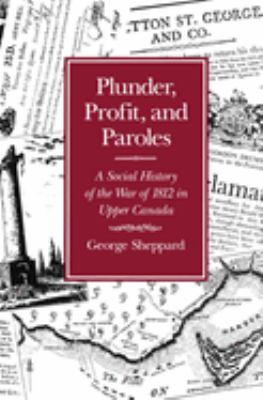
Plunder, profit, and paroles : a social history of the War of 1812 in Upper Canada
Available Copies by Location
| Location | |
|---|---|
| Victoria | Available |
Browse Related Items
| Subject |
| Ontario > History > War of 1812 > Social aspects. United States > History > War of 1812 > Social aspects. Canada > Social conditions > 1763-1867. |
- ISBN: 0773511377 :
- Physical Description x, 334 pages : illustrations, maps, portrait ; 24 cm
- Publisher Montreal ; McGill-Queen's University Press, [1994]
- Copyright ©1994
Content descriptions
| Bibliography, etc. Note: | Includes bibliographical references (pages 309-324) and index. |
Additional Information

Plunder, Profit, and Paroles : A Social History of the War of 1812 in Upper Canada
Click an element below to view details:
Summary
Plunder, Profit, and Paroles : A Social History of the War of 1812 in Upper Canada
Sheppard demonstrates that the colony was a fragmented and pluralistic community before the war and remained so after it. Upper Canadians were divided by racial, religious, linguistic, and class differences and the majority of settlers had no strong ties to either the United States or Britain, with most men avoiding military service during the war. Reviewing the claims submitted for damages attributed to the fighting, he argues that British forces as well as enemy troops were responsible for widespread destruction of private property and concludes that this explains why there was little increase in anti-American feeling after the war. Much of the wartime damage occurred in areas west of York (now Toronto). This was the cause of grievances harboured by settlers in the western part of Upper Canada against their eastern counterparts long after the war had ended. As well, some Upper Canadians profited from wartime activities while others suffered greatly. Only later, in the 1840s when these issues had faded from memory, did Canadians begin to create a favourable version of wartime events. Using garrison records, muster rolls, diaries, newspapers, and damage claims registered after the war, the author delves beyond the rhetoric of wartime loyalties and reveals how the legacy of war complicated colonial politics.


